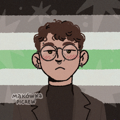Elias reviewed The Secret History by Donna Tartt
The Secret History (Goodreads)
4 stars
Content warning General spoilers
Like all my other reviews, I'm writing this just as I finished the book (at 2am, since I don't know how to keep normal hours).
So, to begin, this book is not at all what I expected. I saw it mentioned several times on the dark academia side of tumblr and vaguely heard there was an important mentor figure in it, so I figured that it was worth a shot. If not for the content, then to know what all the hubbub was about. I'm sure you can imagine my surprise when there was two murders, substance abuse, and a suicide in it. This is not to say I didn't enjoy the book, it definitely earned its four stars, but I was not at all expecting what I got.
To begin, this book has a nice balance between discussing classics and getting on with the actual plot. The scenes focusing on an author or passage of classical literature are relevant to characterization of whichever character is the focal point of the scene and aren't too dense. I am nowhere close to a classics nerd and I was able to understand and appreciate many of the references and passages. The scenes, especially before Bunny's murder, were rich with detail in all the right ways. I found myself thinking about the universe of the book outside of the time I was reading, which isn't something that happens often anymore.
After Bunny's murder, things dragged a bit more for me. The chapters were quite long and often felt like they were repeating themselves, so things could occasionally get boring. This would change near the end, especially around the times Charles started to spiral and Julian found out about Bunny's murder. It was nearly impossible to put down the book after that point. As a small note, I'm glad Richard didn't get with Camilla. I've read enough fiction where the main character gets the object of their affection.
To close this review, I just want to share a passage from the book that left an impression on me:
"Henry," I said. I wanted to say something profound, that Julian was only human, that he was old, that flesh and blood are frail and weak and that there comes a time when we have to transcend our teachers. But I found myself unable to say anything at all. He turned his blind, unseeing eye upon me. "I loved him more than my own father," he said. "I loved him more than anyone in the world."
There are few people more important in a budding academic's life than a particularly great mentor, so this particularly pulled my heart strings.

